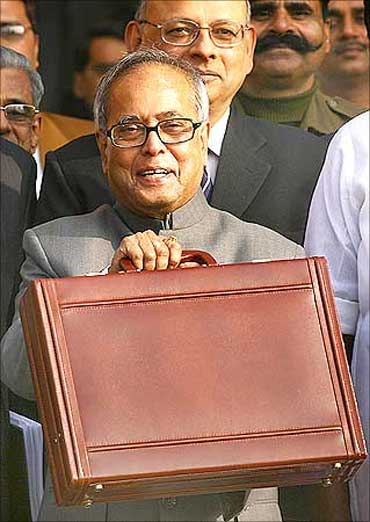
Unlike last year, when India's economic growth had decelerated amid the global crisis, the Finance Minister faces a trickier task this time around-- that of maintaining growth and lowering fiscal deficit. In 2009, the focus was on improving growth.
However, this time the Indian economy is already on its recovery path with many sectors doing well. To give some numbers, industry and services are seen growing at over 8 per cent in 2009-10, as per CSO estimates. Among sectors, auto, FMCG and cement have been recording robust volume growth for several months now.
Reversing concessions With growth returning to the economy, many experts believe that the Finance Minister will have to shift focus to reduce the country's fiscal deficit, which is estimated at 6.8-7 per cent of GDP for 2009-10, the worst in over a decade. Expectations are that the Minister will take measures to lower it to 5.5-6 per cent in 2010-11.In that sense, the Budget is likely to see a roll-back of stimulus measures announced in the past. However, since certain segments like exporters, small and medium enterprises and so on, are yet to see a meaningful recovery, the roll-back of concessions will most likely be from sectors that are doing well (auto, cement, consumer durables and FMCG among a few others).
So, expect partial recovery here. Experts suggest that excise duty rates, which were cut from 10-12 per cent levels (pre-stimulus), will be hiked in the case of these sectors, if not fully restored. Likewise, service tax rate is likely to be restored to 12 per cent.
...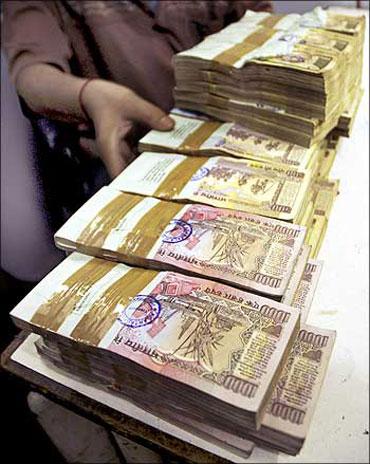
Sustaining growth
While the expected increase in revenues and lower deficit is one part, the Minister will also need to ensure that the recovering Indian economy continues on its growth path towards achieving 8 per cent growth in GDP.
It is expected that the Budget measures will include a good hike in infrastructure and public spending and continued support to the weaker (where recovery is still fragile) and labour-intensive (textiles, leather, jewellery and so on) segments. It is also expected that spending on rural and social schemes will be hiked.
Since certain policy measures like fuel price decontrol, labour reforms and relaxation of FDI (in aviation, retail and insurance) will require political consensus, the Budget may not have major announcements in this direction.
In effect, the market experts expect the Minister to strike a fine balance between sustaining growth rates and curtailing the fiscal deficit, even as they expected him to partially roll-back the stimulus measures announced earlier. Experts, however, say lack of adequate action to control the fiscal deficit will have an adverse impact on market sentiments.
Read on to know the Budget expectations for individual sectors and its likely impact for companies, which, however, will finally depend on how companies react to the same.
What do you expect from the forthcoming Budget for 2010-11? Tell us!

Auto
For a sector that was gasping for breath, the stimulus packages introduced towards the end of 2008 was like a lifeline which helped the sector end 2009 on a strong 16 per cent year-on-year growth. A drop in lending rates and easing of the credit situation aided the revival.
However, considering that most manufacturers are logging record profit margins now, expect a partial roll back of the excise sops. The first sop was the excise duty cut from 14 per cent to 8 per cent for small cars and two-wheelers which is likely to be hiked to 10 per cent or even more.
With raw material prices climbing, manufacturers are likely to pass on the hike which might impinge on demand and may be a dampener on sales at least in the short term.
While larger cars might continue to face a 22 per cent duty, the government may consider reducing duties on utility vehicles considering that a large chunk is used in rural areas.Rationalisation of taxes is another demand which could bring down the tax rate from 23-25 per cent to 16-17 per cent. The CV sector, which has been the biggest beneficiary of the sops, will lose out if the sops (such as duty cuts, accelerated depreciation benefits) are withdrawn, but could benefit if allocation under the JNNURM is enhanced.
What do you expect from the forthcoming Budget for 2010-11? Tell us!
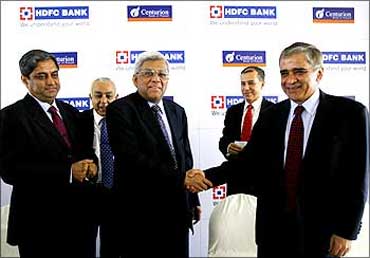
Banking
Measures like hiking in FII holding limits in PSU banks and increase in FDI limit in insurance sector to 49 per cent would make it easier for financial institutions and banks to raise capital for expansions.
Any concrete move to trigger consolidation in the banking sector, especially amongst smaller PSU banks will be positive. The Budget could contain proposals to infuse $2 billion, received from World Bank, into smaller banks.
Extension of farm loan relief deadline to June 30, 2010 would cushion agri NPAs for PSU banks. Allowing banks to raise long-term tax free bonds will be positive and will help them to fund infrastructure projects.
What do you expect from the forthcoming Budget for 2010-11? Tell us!

Capital goods & power utilities
The biggest positive for engineering companies could come in the form of imposition of import duty on power equipments, as power utilities have resorted to importing equipments from China and Korea, which are 15-20 cheaper and are being delivered much faster.
The move could spell good news for power equipments producers like BHEL and L&T. Any substantial increase in the expenditure on schemes like APDRP and RGGVY will benefit T&D equipments producers and EPC service providers in terms of higher business.
In the T&D space, companies could also benefit if the government proposes to set up the National Electricity Fund with an estimated corpus of Rs 80,000 crore, aimed at providing loans to States for improving T&D infrastructure.
Higher investments towards defence equipment should be positive for companies like Bharat Electronics and L&T.
For power utilities, the benefits under section 80IA (tax exemption for 10 years) given to companies building mega power projects is expected to be extended by one year, which is currently slated to expire in March 2011.
However, imposition of import duty on equipment will increase their project costs, in cases where equipments are yet to be imported.
What do you expect from the forthcoming Budget for 2010-11? Tell us!

Construction & infrastructure
The infrastructure and construction sectors could remain in the limelight particularly given last year's delays in award of the new projects.
Schemes like Bharat Nirman (development of rural infrastructure) could get higher allocation benefiting construction companies like IVRCL and Nagarjuna Construction among others.
Higher allocation for JNNRUM (for urban infrastructure) will benefit companies like Patel Engineering, Pratibha Industries, Unity Infra, Ahluwalia Contracts and Simplex Infrastructures.
Companies are also expecting clarity on refinancing or take-out financing; it will be positive for projects which are stalled for want of funding. Among other things, the sector hopes that the MAT provision under the new tax code is relaxed. Analysts say, if the tax is levied on gross assets, it will be negative.
What do you expect from the forthcoming Budget for 2010-11? Tell us!
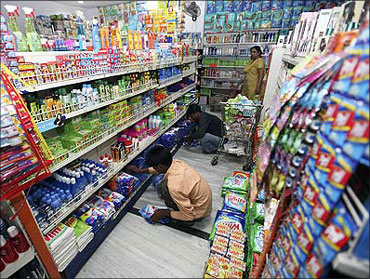
The sector is an indirect beneficiary of government's focus on the rural economy through its various employment generating and rural infrastructure schemes.
Any increase in rural spending would put money into urban pockets that could also bring cheer to FMCG companies. However, the excise duty reduction from 12 per cent to 8 per cent that benefitted companies earlier, is expected to be hiked by about 2 percentage points.
This could negatively impact most companies, while Dabur, Marico might remain relatively insulated.
ITC's cigarette volumes jumped by 7-8 per cent recently; one of the reasons was the status quo on duties -- this Budget could see a hike in duties.
An increase of more than 5 per cent in excise duty could impact its cigarette volumes. Other negatives that might affect FMCG companies, in general, is a hike of service tax to 12 per cent, while an increase in MAT (could affect Dabur and GCPL more) is also likely.
What do you expect from the forthcoming Budget for 2010-11? Tell us!
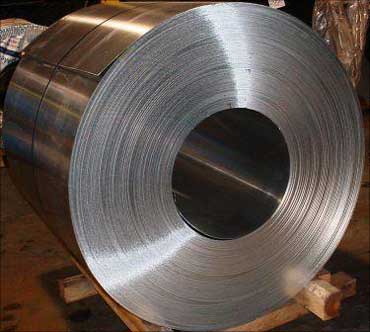
Metals
Domestic steel companies have reported good value growth in the recent past on account of higher demand from the auto and infrastructure sectors. But, realisations continue to be low on account of lower steel prices compared to 2008 peak levels.
In case the excise duty cut provided in the stimulus package is reversed (hiked to 10 per cent), it could impact steel demand to some extent. However, if the spending on infrastructure is increased, it will be positive for steel companies, particularly those producing long products.
Analysts also expect the Finance Minister to hike export duty on iron ore lumps from 10 per cent and iron ore fines from 5 per cent, currently. The move could be positive for domestic steel producers, mainly for non-integrated players, and negative for Sesa Goa.
What do you expect from the forthcoming Budget for 2010-11? Tell us!
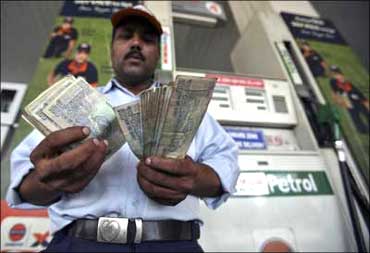
What do you expect from the forthcoming Budget for 2010-11? Tell us!

Pharma
The pharmaceuticals business on the back of new launches has grown at about 18 per cent for the first nine months of 2009-10. To boost R&D investments, the sector wants the government to increase the weighted deduction on research expenditure from 150 per cent to 200 per cent.Further, the sector is demanding this deduction be extended beyond 2012 for a further period of ten years. The sector might have to shell out more if the excise duty on drugs is raised from the current 4 per cent (formulations) and 8 per cent (bulk drugs).
However, with most companies having units in excise-free zones this might impact only those with units located outside these zones. Further, there is a demand from companies that all life savings drugs, unlike a few currently, should be exempt from excise and customs duties.
What do you expect from the forthcoming Budget for 2010-11? Tell us!

Telecom
Profitability rather than growth is an issue the sector is more worried about currently. While subscribers are growing by half every year, profitability is shrinking on the back of falling tariffs.
The sector is seeking a 100 per cent tax exemption under Section 80IA from the current 5 to 10 years at par with other companies in the infrastructure sectors. A lower or uniform tax rate (as a percentage of revenues) instead of multiple heads of licence, spectrum and service tax is also another industry demand.
There is also a likelihood of the rollback of 2 percentage points cut in service tax introduced as part of the stimulus. However, any increase is likely to be passed on to the consumer by the telecom companies.
What do you expect from the forthcoming Budget for 2010-11? Tell us!
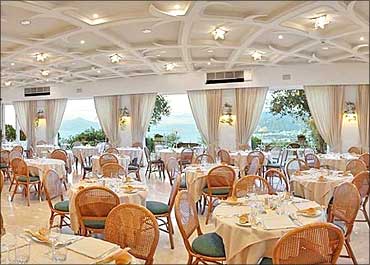
Miscellaneous
The hospitality sector, which has seen tough times in the first half of 2009 on the back of falling occupancies and is on its way to recovery now is asking for infrastructure status which will enable new hotels to get 100 per cent tax exemption on profits for ten years.Aviation players are asking the government to reduce duties on ATF, a move that will improve their profitability. Amid improving sales and profitability, the retail sector wants the government to allow FDI into multi-brand retailing. The entertainment media space, which is struggling to post profits, has asked for the exemption of import duty of 5 per cent on set top boxes.
The realty sector, which is yet to come to grips with sluggish demand, has asked for an increase in income-tax exemption limit to Rs 3 lakh from Rs 1.5 lakh. Realty companies are also asking for infrastructure status for integrated townships. Further, the industry has sought to extend the deadline for projects under Section 80-IB by two years to 2014.
To take positive vibes forward, the software sector expects an extension of STPI tax exemption beyond 2010-11. Clarity on calculation of tax benefits available for SEZ units under Section 10AA (if the entire profits generated from SEZ's are tax free) would be positive for the sector with Infosys and HCL Tech expected to benefit the most.
What do you expect from the forthcoming Budget for 2010-11? Tell us!